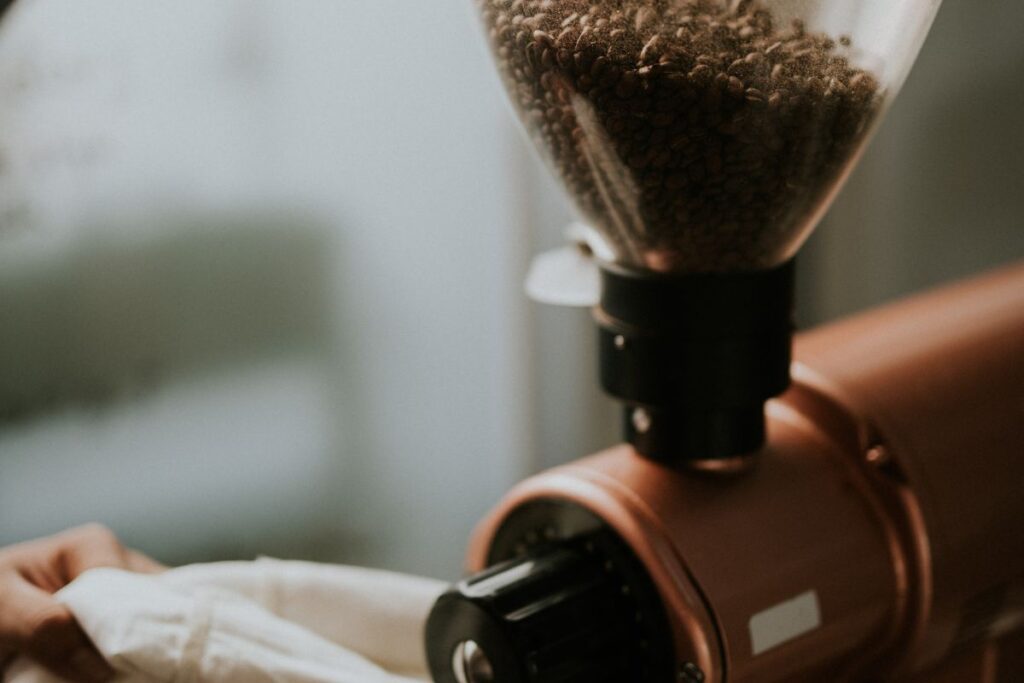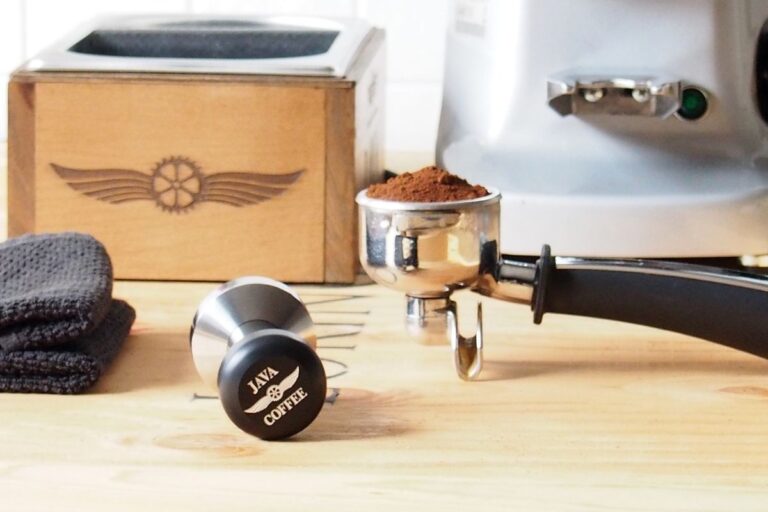Choosing a commercial coffee grinder for a coffee shop is not that simple.
Of course, some people still think that the most expensive coffee grinder is the best. But is it truly like that?
According to my experience, not always.
That’s why I wrote this detailed guide.
By Jozo Salmanić – Croatian barista with 15 years of experience.
Affiliate disclosure
This page may contain affiliate links – we may earn a small commission when you make a purchase through these links. This is at no extra cost to you.
Is choosing a commercial coffee grinder for a coffee shop that hard?
It can be, especially when the range is this wide. “A great grinder will transform your coffee experience from the inside out,” says Raj Jana.
Coffee grinders are the backbone of every coffee shop, and there are a few things you must consider.
Grinder type
We have three basic types of coffee grinders, as Paul from Delishably states.
However, manual grinders can’t be used commercially, so I’ll focus on the other two.
Blade grinders use the spinning blade to grind the beans, while burr-type grind beans between two serrated plates.
Blade grinders
Blade grinders are not an option, not even for your house.
Blade-type grinders overheat the beans and produce an uneven grind.
Any coffee shop with a blade coffee grinder is doomed to fail.
Flat burr grinders
Flat burr grinders are more than a great choice, as they produce even grind aka great flavor every time.
The only drawback is that they generate heat when you overwork them, so they are not the best choice for crowded places.
Conical burr grinders
Conical burr grinders are the best choice.
They are durable, produce even grind, and don’t overheat.
Also, they spend less energy and create less noise.
How many cups of coffee do you make daily?
A gigantic coffee grinder for a small coffee shop is usually overkill, and you will end up using a minimum of the options it offers.
On the other hand, if you make a lot of coffee, and have more than one barista, you will need a quicker commercial coffee grinder for your coffee shop.
Time is money, my friend.
How much will your new grinder grind?
Closely connected with the amount of coffee you make every day.
Some models hold up to one pound of beans, while others will allow up to several pounds.
Some coffee grinders can grind only a limited amount of beans before needing rest, while others are made for hard (ab)use.
Grinder settings
If you are making only espresso-based drinks, the grinder settings don’t have to be too diverse.
They still have to be adjustable, as La Marzocco points out.
However, if you plan on brewing different coffee drinks, you will need a commercial coffee grinder that can deliver that.
Precise settings are also crucial if you want to keep your guests satisfied.
Skilled baristas know when and how to micro-adjust the grind, so they can pull out a perfect cup of Joe every time.
Lately, mid-size cafes almost made it a rule to have two grinders: one for their usual beans and another for their monthly or weekly specialty beans.
Durability
The best coffee grinders for a coffee shop don’t come cheap.
Even if you own a small artisan shop, you’ll still want a coffee grinder that can last for a long time.
As your business grows, your grinder will be used heavily, and you need to choose a long-lasting one.
Trust is good, but the warranty is better.
The best grinders always come with a couple of years of warranty on the build and the burrs.
Why do you need only the best commercial coffee grinder for your coffee shop?
To make a cup of coffee, you need to break the beans, so water can extract the coffee flavor. That’s why we use coffee grinders.
To make a lot of coffee in your shop, you need to grind whole lotta beans.
You can’t do that with your $20 gas station grinder.
Only freshly ground beans can produce the best coffee your guests have ever tried.
And for that, you need a sturdy, modern, and reliable coffee grinder.
The one that will make your guests come back for more and more of that hot delight people call coffee.

How much can the best commercial espresso grinder cost?
How much can a car cost? The answer is not simple.
Good things are never cheap.
Even the basic commercial espresso grinder will cost around $1000, and it won’t amaze you with the options available.
However, that can still be a decent coffee grinder for your small coffee shop.
As for the maximum price, it all depends on your budget.
If you have $10k for spending, you can get the coffee grinder of your dreams.
Renting a grinder is also an option for small coffee shop owners.
This way, you pay a fixed amount every month.
In the long run, it will give you a perspective on what kind of coffee grinder your coffee shop needs.
Can you get used commercial coffee grinders for your coffee shop?
If you have a choice, always go with the brand-new commercial coffee grinder for your coffee shop.
Especially if you are new to the world of grinders.
It’s much like a new vs. used car.
A used car is cheaper, and if you know what you are doing, you go there, kick the tires, check the oil, take it for a spin, and if it’s OK, you buy it.
However, the new car wins every time.
If the budget doesn’t allow you to buy a new grinder, buy a used one, but start saving for a new grinder immediately.
Most of the used coffee grinders will need an immediate burr change, which will set you back an additional couple of hundred dollars.
It’s usually not worth it.
Also, be wary of ‘too-good-to-be-true’ offers on Craigslist or Facebook Marketplace.
If a coffee grinder costs less than dinner and a movie, there is something wrong with it.
Is the Bunn coffee grinder a good choice for my coffee shop?
Bunn coffee grinders are one of the most respectable ones in the market.
In fact, they became a symbol of long-lasting, sturdy machines which offer an unmatchable and precise grind.
Most Bunn grinders outlast their warranty for at least a couple of years.
What is a Bunzilla?
We are not talking about giant cute bunnies this time. No siree, Bob.
Bunzilla is a love child of the G series Bunn grinder and Ditting burrs.
Coffee lovers all around the world are buying used Bunn grinders and installing Ditting burrs inside, using an adapter ring.
Result – a true behemoth that will not fit many counters, but will offer you superior grind.
The process is relatively simple, and you can find a lot of DIY guides and videos.
However, Bunzilla is just a fun coffee trend, and nothing much useful.
If you are eager to try it, the coffee lovers from Home-Barista can answer your questions.
Do you need two commercial coffee grinders in your coffee shop?
Two coffee grinders are a must if you sell or offer flavored coffee beans.
You should use one grinder for regular beans, and another for flavored ones, so the aromas don’t mix.
Some owners I’ve met claim they are good with using just one, but I don’t go to those shops anymore.
Two grinders are also great if you are planning to expand your little coffee shop’s offer.
You still don’t know if the new thing (let’s say Chemex coffee) will catch on, and you can’t risk buying an expensive new coffee grinder.
So, you rent or buy a smaller one, to see if the new trend will make you money.
If yes, it’s easy to buy the real deal.
Do I need the best gravimetric grinder for my coffee shop?
Gravimetric grinders grind the beans by weight, not by time.
They are built to improve the accuracy in all your everyday coffee-making, as well as reduce waste.
Every metric in the world of coffee is defined by weight, not volume.
Yes, even water.
Most coffee shops use timed grinders and check the weight using a scale.
With gravimetric grinders, you enter the desired coffee weight, and the grinder delivers just that.
No doubt, gravimetric grinders are more precise.
However, they do come with a higher price tag and are slower than timed grinders.
If you are willing to sacrifice a bit of performance speed and a bit of cash, I say, go for it.
To sum up
A commercial coffee grinder is a necessity for every coffee shop, from small ones, to coffee chains.
When buying it, choose the one that fits your budget, and your everyday operations.
If you can afford it, always go for modern commercial coffee grinders, with a durable build and more functions for your future coffee shop empire.
Buy once, buy well.
That’s the rule.
Further Reading – Should You Buy A Coffee Maker With Coffee Grinder Or Without?
By Marcelo.
For a coffee shop you’ll need a grinder, but at times it may be worth getting started with a coffee maker that has a built-in coffee grinder.
That coffee maker will probably be made for home use and all parts will not last for years when making tens and tens of cups a day. At one point and rather sooner than later it’ll become a back-up machine.
Built-in grinders can be great but there’s also a high chance that you’ll be stuck with a low quality grinder.
And there’s also instances in which getting a separate grinder is actually cheaper for you.
So it raises the question: should you buy an espresso machine with a grinder or without?
By the way, have you had a look at our deals page yet?
Built-in Grinders: The Best and The Worst
Let’s start with the simpler aspects of it: having a grinder in your espresso machine is super convenient.
It saves you a whole other kitchen appliance which will take up space, consume electricity, and have its own chores like cleaning it etc.
And this is actually its biggest selling point.
To someone like me who’s all about convenience, it’s actually a very tempting thing.
The moment I heard of built-in grinders, I thought I had to get one—no thoughts about it.
However, having had more than a decade of experience with espresso machines with built-in grinders, I have a few things to say about them—not everything is about convenience.
And convenience doesn’t trump everything else.
It’s All About Maintenance
One of these things is hygiene. I’ve talked extensively before about how important hygiene is for coffee grinders.
When grinding coffee hundreds of infinitesimal coffee particles fly off, and because of the static created by the movement and friction, they will stick to any surface they hit first.
And because coffee contains oils—which are actually responsible for a lot of its flavor and aroma—these oils will go rancid and give off a bad smell. In time, this translates to bad tasting coffee.
Coffee grinders can usually be taken apart, or opened to some extent.
Then you can use a brush to clean them and get all of the coffee particles out… But this is usually not the case for built-in grinders.
For one reason or another, you can’t access the inside of these grinders, which means you can’t actually clean all of it—only the outermost part.
And although I love the convenience of it, sometimes I just can’t get over how impossible it is to clean them.
They Can Be Pricey….
Another big aspect is price.
The expectation usually is that you would pay only slightly more than you would for an espresso machine, in other words, that you would be saving money.
And there are cases when this is true, but my experience with these inexpensive built-in grinders is that they are rather low quality.
What I’m trying to say is that if you’re looking at built-in grinders to save money, don’t.
Cheaper grinders produce very bad results which won’t ever satisfy you—they are a very bad investment. Instead, try to aim for high-end home espresso machines with built-in grinders
Summary
And so, to answer the big question: it depends. If you’re somebody that values convenience over all else, then you’re going to absolutely love built-in grinders.
On the other hand, if you’re looking for a grinder that you can actually take care of, and keep in top condition, then getting a separate grinder will actually be a better option for you.
Photos by 1360023 and Nathan Dumlao





